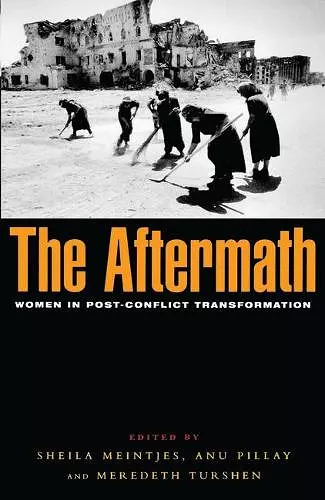The Aftermath
Women in Post-conflict Transformation
Meredeth Turshen editor Sheila Meintjes editor Anu Pillay editor
Format:Paperback
Publisher:Bloomsbury Publishing PLC
Published:31st May '02
Currently unavailable, and unfortunately no date known when it will be back

What happens to women in the aftermath of war? This text asserts that for women there is no aftermath - a truce does not end gender violence. It asks how transitions from war to peace and from authoritarian to democratic regimes can become opportunities for real social change.
What happens to women in the aftermath of war and internal armed conflict? Are gender and inter-generational relations transformed during the process of post-war reconstruction? This book asserts that there is no aftermath for women -- a truce does not bring an end to gendered violence. It shows how the post-war period is too late for women to transform patriarchal gender relations; the foundations for change must be built during conflict. The first part of this book asks how transitions from war to peace and from authoritarian to democratic regimes can be used as opportunities to move beyond the reconstruction of pre-war institutions to real social transformation. It presents an honest accounting of what women lose and gain in wartime and how they organise, as well as an analysis of why they fail to consolidate their gains. It explores the many dimensions of violence against women before, during and after war. It reflects on how war changes identities, on the myths that men and women invent about each other in wartime, and on the problems of reconciliation and women's solidarity; and it focusses specifically on shifts in gender relations in the context of post-conflict reconstruction and transformation. Finally, the contributors consider the relation of the state to society in the aftermath, searching for a vision of the transformed society. The evidence presented in the second part of this book documents the varied nature of war and the many post-war situations, including Haitian and Balkan examples, Asian cases, and experiences in different African conflict zones. The contributors analyse what women endure and what they construct during and after conflict, what obstacles they encounter in their search for autonomy and what bonds of solidarity they create in building peace.
'This volume does contain much detailed and empirical research on the roles of women in modern conflicts.' Barbara Hately-Broad, Journal of Military History Praise for Meredeth Turshen's previous book, What Women do in Wartime: 'This remarkable book should be compulsory reading for anyone wanting to understand more about conflict and its impact on women and society as a whole...Comprehensive, readable and well referenced.' Health and Policy Planning 'The testimony provided in this book is vitally important...Turshen and Twagiramariya are to be commended for forcing the unthinkable into our awareness.' Review of African Political Economy 'What Women do in Wartime describes and analyses the experience of women in African civil wars...The images which emerge are both powerful and disturbing. [The book] serves as an insistent testimony of the personal suffering, tragedy and degradation of warfare.' International Affairs 'What Women do in Wartime provide[s] a powerful delineation and analysis of women's experiences in civil wars, wars of liberation and their aftermath.' Agenda 'An important and exciting contribution to [the] writing of women's narratives of war... It drives home the need to bring women into the decision-making process, be it for war-waging or sustainable peace-making'. Seminar
ISBN: 9781842770672
Dimensions: unknown
Weight: unknown
272 pages